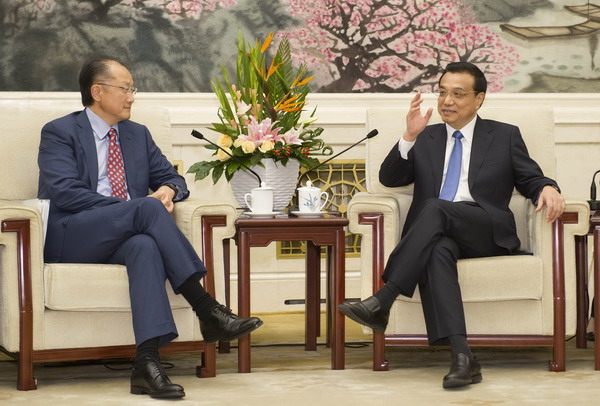Innovation should drive reform: Premier Li
Updated: 2013-09-17 23:35
By Chen Jia (China Daily)
|
|||||||||||
Innovation should be one of the major driving forces of China's ongoing economic reforms and development in the future, as the country's GDP is expected to slow from double-digit growth, Premier Li Keqiang said on Monday.
Li stressed that China's innovation drive should cover several areas, including technology, the economic system and the government's management mechanism, which are closely linked with the reform blueprint formed since he took office in March.
 |
|
Chinese Premier Li Keqiang (R) talks with World Bank Group President Jim Yong Kim in Beijing on Monday.[Photo/Xinhua] |
The Premier made the remarks at a meeting with the World Bank's President Jim Yong Kim in Beijing. This is the second time that Kim has visited China since he became the top leader of the organization.
Li sees innovation as the main driver to promote social comprehensive competitiveness, improve the quality and efficiency of economic development, as well as accelerate the growth pattern's upgrading process.
The world's second-largest economy went down from 7.9 percent GDP growth in the fourth quarter of last year to 7.7 percent in the first quarter of this year and 7.5 percent in the second quarter, with a reduced increase in consumption, investment and foreign trade.
Meanwhile, existing problems, including an excess of production capacity in the manufacturing sector, shadow-banking risks and expanding local government debt require the government to keep making progress on the reforms to secure the economic growth's bottom line.
On Sep 11, at the opening ceremony of the seventh Annual Meeting of the New Champions 2013, known as Summer Davos, Premier Li said in his keynote speech that "reform and innovation is the running theme and spirit of the policies adopted by the Chinese government and it is the banner that we will always hold high".
"We are implementing the innovation-driven development strategy at a faster pace, aggressively promoting technological innovation and deep integration of science and technology with the economy, and are building a social environment friendly to innovation and business start-up activities," Li added.
Louis Kuijs, chief economist at the Royal Bank of Scotland, said that China will not grow at 10 percent per year anymore but at around 8 percent in the coming years, moderating to around 7 percent by 2020.
"Li rightly focuses, in his presentation and in his work on economic policy, on structural reforms," Kuijs said. "It's good to see that there seems to be a reasonable degree of consensus on how to move forward on financial and monetary reform."
The World Bank is working with China on a broad agenda including eliminating poverty, protecting the environment and improving the urbanization process.
Liu Yuanchun, associate dean of the School of Economics at Renmin University of China in Beijing, said that the sustainable growth of China's economy will remain a driving force of global development.
Related Stories
Growth range leaves leeway for reforms 2013-09-12 09:28
China needs reforms for economic development: Premier Li 2013-09-10 21:48
Reforms urged for pharma industry 2013-09-04 02:42
Control housing prices by reforms 2013-09-02 23:15
China to deepen tax reforms: financial minister 2013-08-28 15:49
Railway reform misses its mark 2013-08-26 20:25
Today's Top News
China upgrades warning for super typhoon
Worries linger despite apology on GM rice test
Huawei to create 5,500 new jobs in Europe
Syria details part of chemical arsenal
Starbucks' Internet called safer than Pentagon's
Putin may seek re-election in 2018
Action pledged for new type of Sino-US ties
13 injured in Chicago park shooting
Hot Topics
Lunar probe , China growth forecasts, Emission rules get tougher, China seen through 'colored lens', International board,
Editor's Picks

|

|

|

|

|

|





